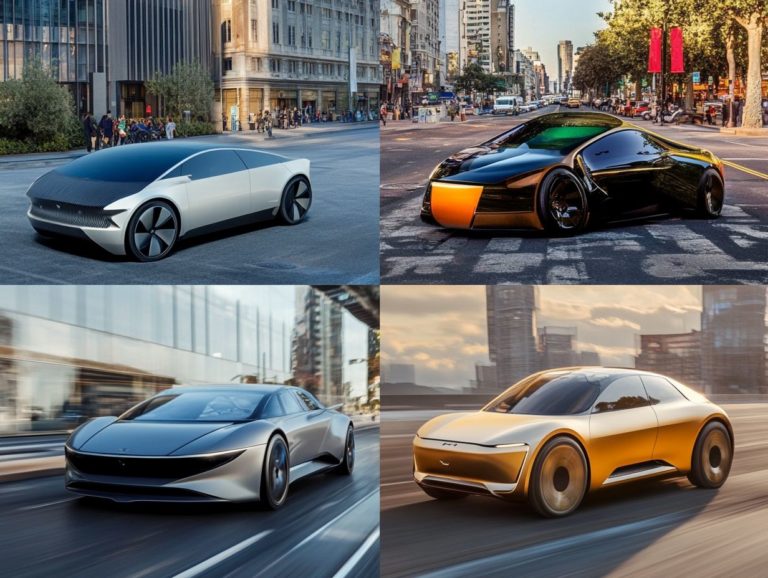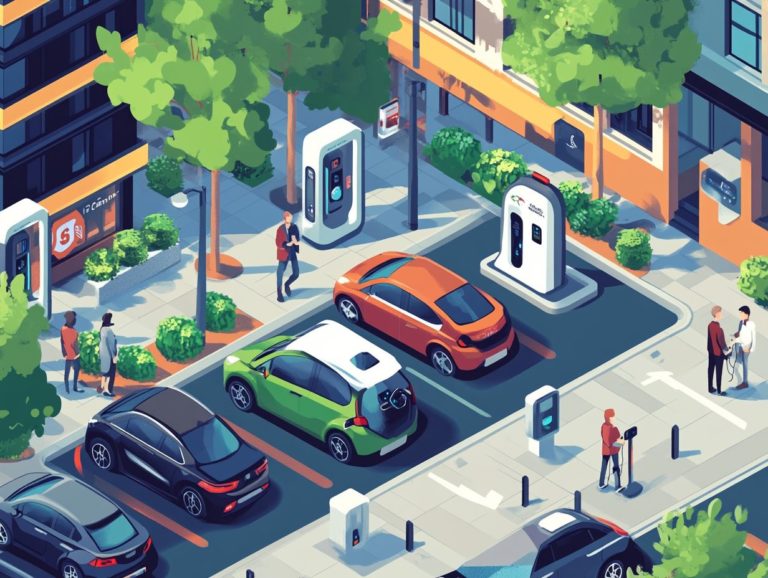66. what makes a great electric vehicle charger?
As electric vehicles (EVs) gain traction in the mainstream market, it becomes essential to understand the different types of chargers available.
This article delves into the various electric vehicle chargers, emphasizing key features that set each one apart, such as fast charging capabilities and advanced smart technology.
When choosing a charger, it’s crucial to consider factors like power output and installation requirements. This ensures a seamless experience.
You’ll also find tips for maintaining your charger. Explore options for future upgrades to ensure your EV is always ready for the journey ahead.
Contents
Key Takeaways:
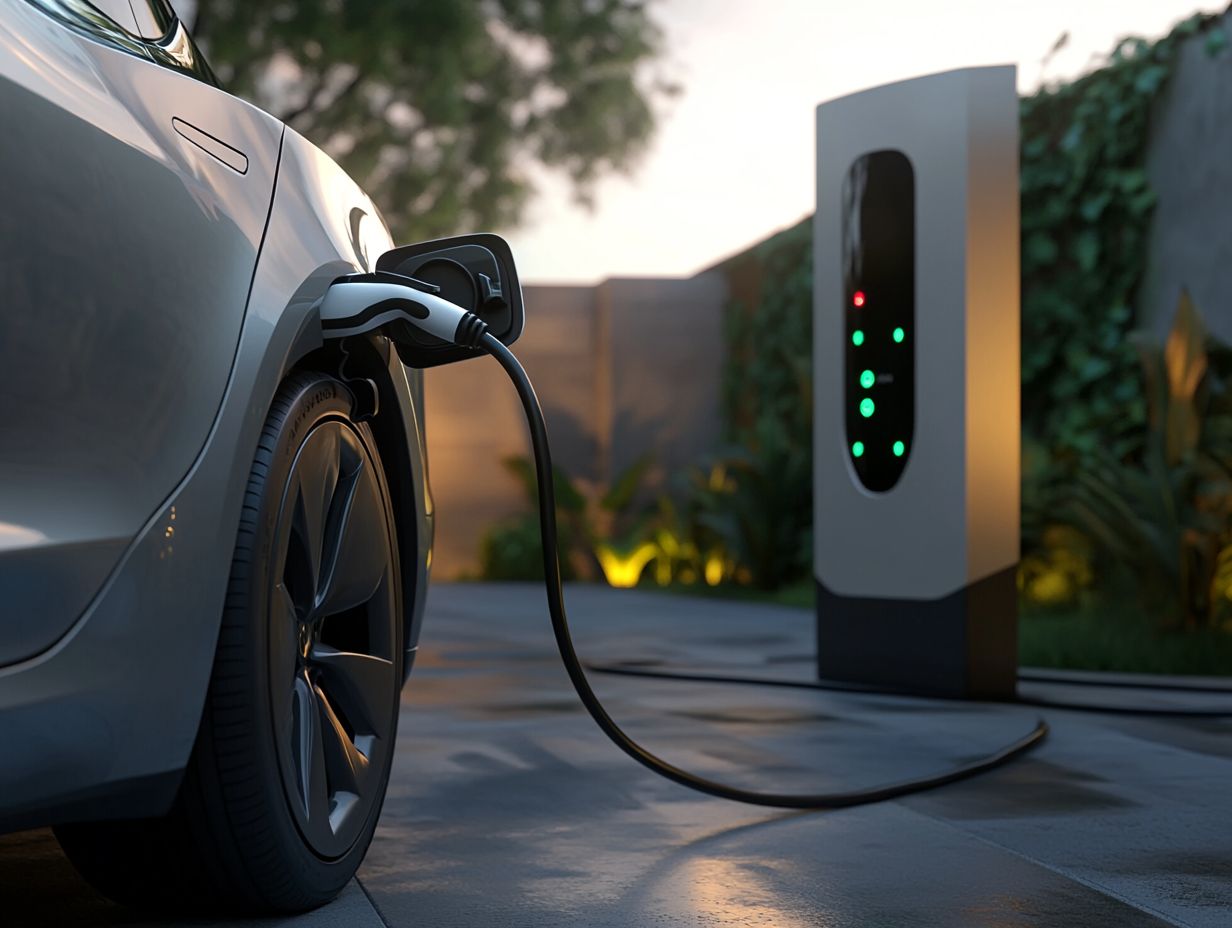
Fast charging capability is a key feature of a great electric vehicle charger, allowing for quick and convenient charging on the go.
Compatibility with different vehicles is important for flexibility and accessibility, making sure your charger can work with any electric vehicle.
Smart charging features, such as remote monitoring and scheduling, can greatly enhance the user experience and optimize charging efficiency.
Understanding Electric Vehicle Chargers
Understanding electric vehicle (EV) chargers is essential for you as an EV driver seeking to elevate your electric mobility experience and overcome worries about running out of charge.
As the industry continues to evolve, electric vehicle chargers have emerged as vital elements of the charging infrastructure. This ensures that you have access to efficient and strategically located charging stations.
Providers such as Phillips 66, FreeWire, and EV Connect are at the forefront, advancing technology that supports faster charging.
With various charging levels Level 1, Level 2, and Level 3 available, there s a solution tailored to meet your diverse needs.
Types of Electric Vehicle Chargers
Electric vehicle chargers come in several varieties, primarily classified as Level 1, Level 2, and Level 3. Each has distinct power outputs and charging capabilities.
- Level 1 chargers provide a basic AC charging option, perfect for overnight home charging.
- Level 2 chargers offer a faster charging solution for those seeking convenience.
- Level 3 chargers harness DC fast charging technology to deliver ultra-rapid charging speeds.
Level 1 chargers typically operate at 120 volts. They may take anywhere from 12 to 20 hours to fully charge an electric vehicle.
In contrast, Level 2 chargers run on 240 volts. They can reduce charging time to around 4 to 8 hours, making them ideal for workplaces or public charging stations.
Level 3 chargers, often referred to as DC fast chargers, can replenish an EV’s battery in as little as 30 minutes. This makes them essential for long-distance travel and significantly enhances the overall efficiency of the charging infrastructure.
Leading companies like FreeWire and Tesla are driving these advancements forward. They consistently innovate to improve charging speeds and accessibility.
Their efforts not only accelerate the widespread adoption of electric vehicles but also help establish a robust and reliable charging network that meets the evolving needs of today s consumers.
Key Features of a Great Electric Vehicle Charger
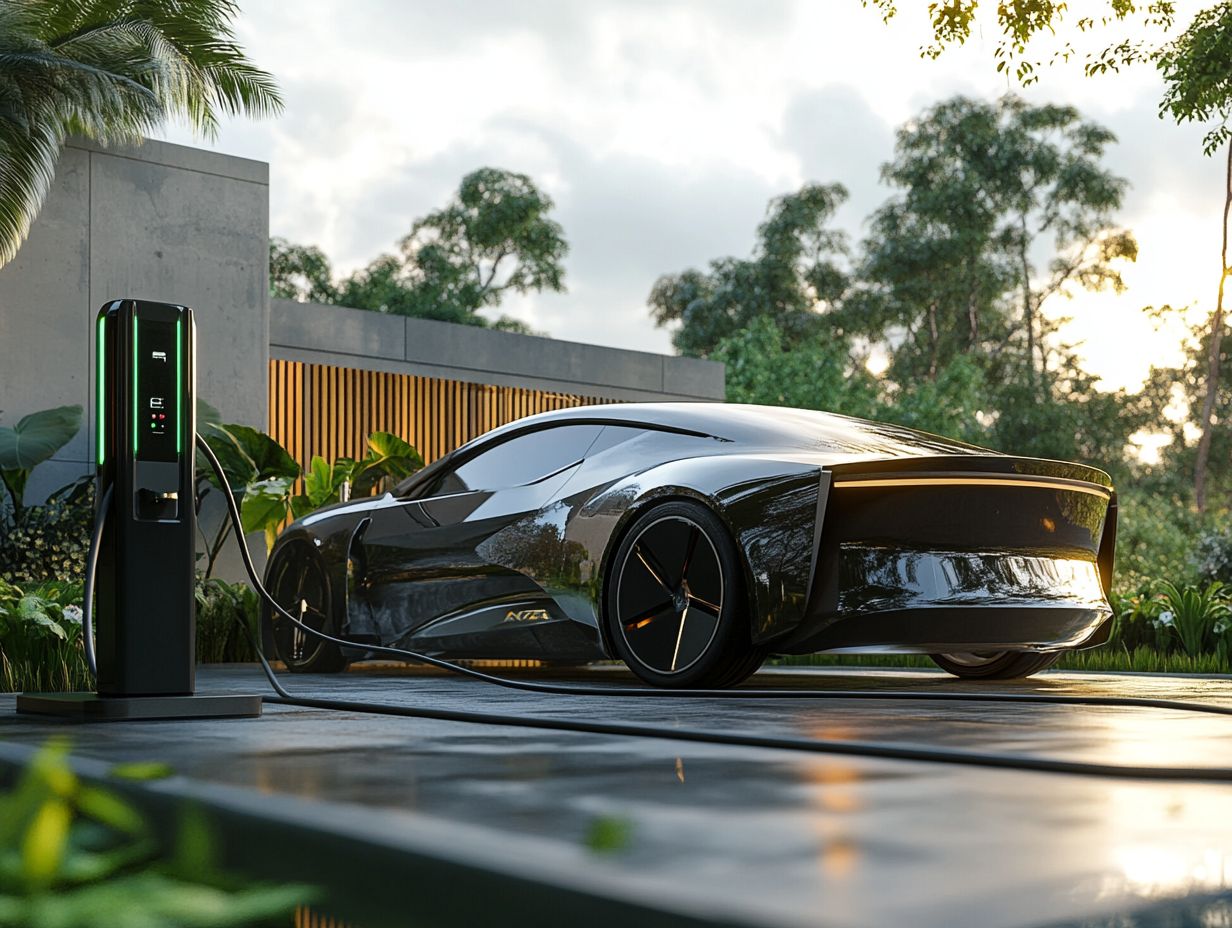
A great electric vehicle charger doesn t just charge; it transforms your entire driving experience!
Fast charging capability, compatibility with various vehicle models, and advanced smart charging options are among these standout elements.
These features guarantee efficient and safe charging. They also contribute to lowering operational costs linked to battery maintenance and charging expenses.
This aligns seamlessly with the NHTSA s recommendations on safety standards, ensuring a reliable and cost-effective solution for your electric vehicle needs.
Fast Charging Capability
Fast charging capability stands out as one of the most coveted features in electric vehicle chargers. It allows you to charge your vehicle rapidly and efficiently, minimizing your downtime.
Ultra-fast chargers, like those crafted by Tesla and FreeWire, can dramatically cut down the time needed to recharge your vehicle s battery. This ensures a seamless experience for you while you’re on the move.
These advanced charging stations often deliver power outputs that can soar up to 350 kW or more. This enables charging rates that can add significant range in mere minutes. Increasingly, consumers are gravitating towards these ultra-fast options, especially in public and commercial settings where every second counts.
Quick charging stations enhance your user experience and pave the way for broader adoption of electric vehicles. With a variety of models available, including offerings from Electrify America and Ionity, you have a wealth of choices tailored to your specific charging needs.
Locations must invest in infrastructure to meet this growing demand.
Compatibility with Different Vehicles
Compatibility with various electric vehicles is crucial when it comes to electric vehicle chargers. You want chargers that power up your car quickly and easily, no matter the make or model.
Chargers that align with the North American Charging Standard, like those designed for Tesla and Chevy Bolt models, offer a seamless experience for EV drivers. They accommodate a diverse array of electric vehicles with varying charging needs.
This compatibility goes beyond mere convenience; it plays a significant role in the adoption of electric vehicles. Many EV drivers face obstacles, such as limited access to charging stations that don t support their specific vehicle models. This can lead to frustration and that all-too-familiar range anxiety.
To tackle these challenges, it s essential to develop a standardized charging framework that promotes interoperability among different manufacturers. This could mean establishing clear guidelines for charge port designs and communication protocols. Such advancements would enable you as an EV driver to charge your vehicle confidently, no matter where your journey takes you.
Smart Charging Features
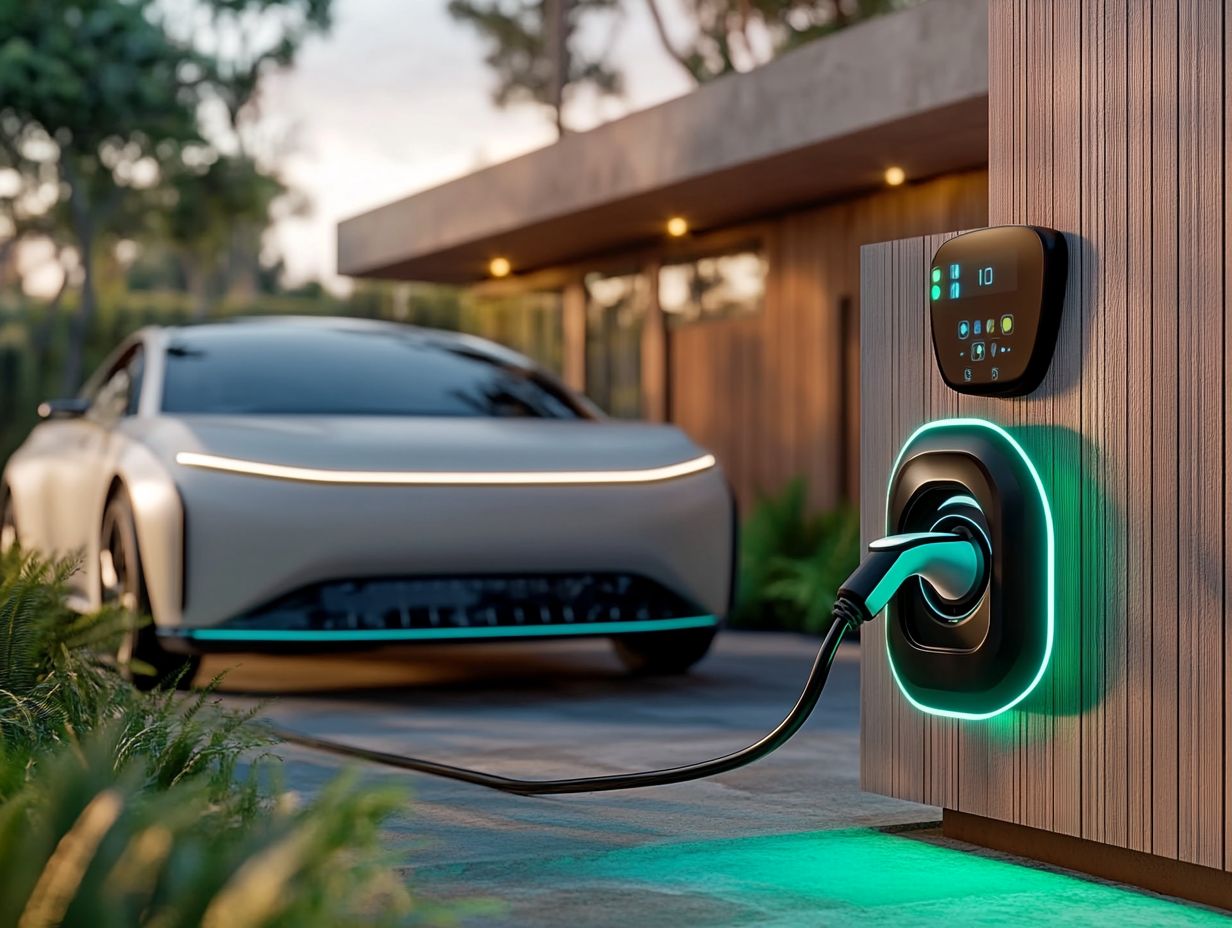
Smart charging features are becoming the gold standard in modern electric vehicle chargers. They bring enhanced energy management and user convenience directly to EV drivers like you.
With these technological advancements, you can easily monitor your charging status in real-time, schedule charging during off-peak hours, and optimize energy consumption to keep those charging costs in check.
Many of today s chargers connect seamlessly with home energy management systems, allowing you to balance your energy loads effectively.
By leveraging sophisticated algorithms that analyze electricity tariffs and grid demand, these systems identify the most efficient times for you to charge. This benefits both your wallet and the environment.
Load management features prevent charging from using too much power at once, enhancing safety and reliability. These innovative functionalities not only make the charging process smoother but also significantly contribute to your sustainable energy efforts.
Factors to Consider When Choosing an Electric Vehicle Charger
When selecting an electric vehicle charger, you should consider several key factors, such as power output, installation and setup requirements, and associated costs and warranties.
By understanding these elements, you ll be better equipped to choose a charger that aligns with your specific needs. You ll also gain valuable insights into long-term charging costs and compatibility with your vehicle.
Power Output and Voltage
Power output and voltage are essential specifications that dictate the charging rates of electric vehicle chargers. They directly influence how swiftly you can replenish your vehicle’s battery. It s essential to grasp the distinctions between Level 1, Level 2, and Level 3 chargers, along with the roles of AC (Alternating Current) and DC (Direct Current) power, to select the ideal charging solution.
- Level 1 chargers, which typically use standard household outlets, offer a modest power output of around 1.4 kW. While they re perfectly suited for overnight charging, they may not be the best choice for your daily needs.
- Level 2 chargers provide 3.3 to 19.2 kW, delivering significantly faster replenishment times. This makes them a prime option for both residential and commercial setups.
- Then there are the powerhouse Level 3 chargers, better known as DC fast chargers, which can unleash up to 350 kW, allowing for rapid charging at public stations.
The voltage associated with these levels plays an important role in charging performance. Higher voltages often equate to greater efficiency, meaning you spend less time waiting for a full charge while keeping your vehicle’s battery health in top shape.
Installation and Setup Requirements
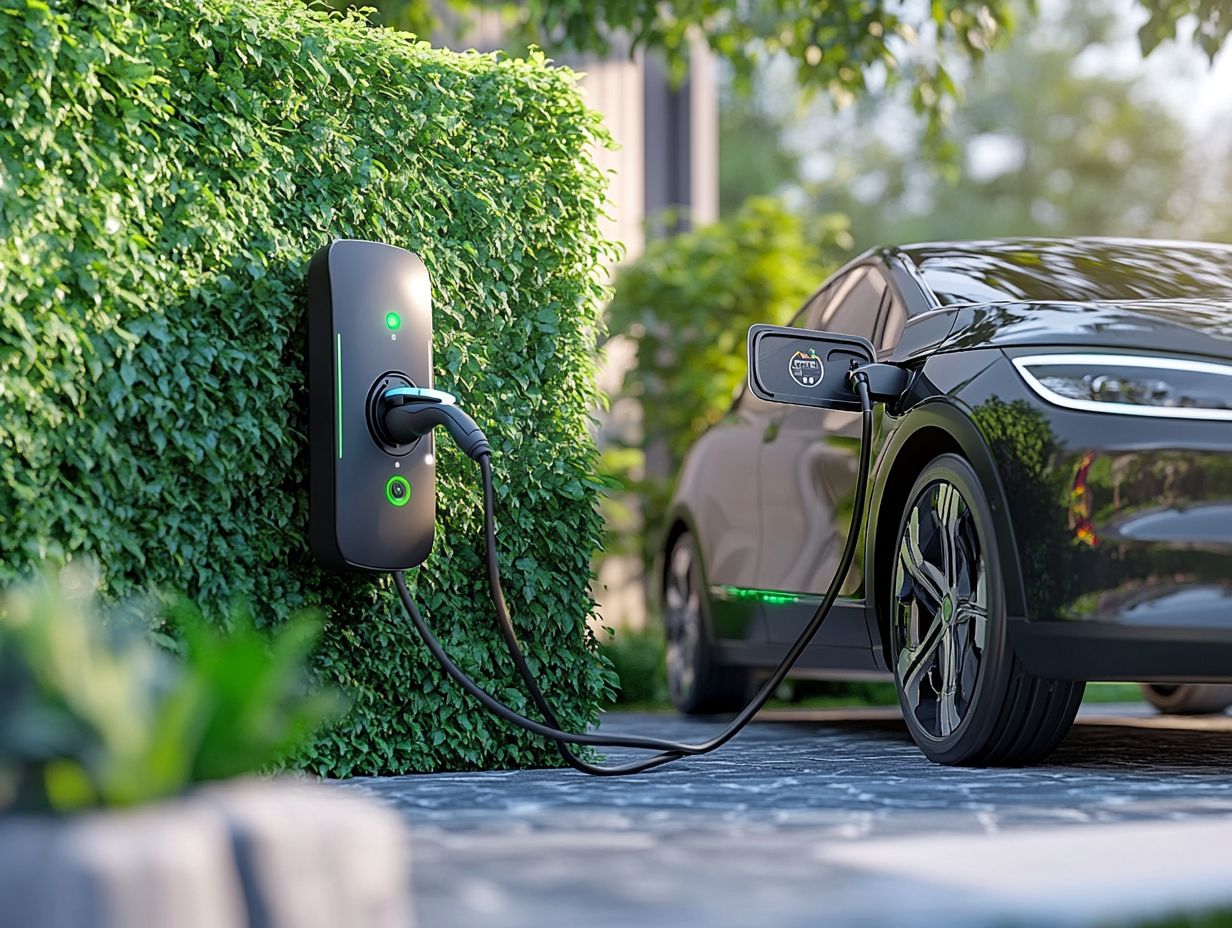
Installation and setup requirements for electric vehicle chargers can vary greatly depending on the type of charger and its location, whether you re considering home charging or public charging stations. Understanding the necessary infrastructure and technical specifications is crucial for ensuring optimal performance and safety.
For residential installations, you need to consider factors like available electrical capacity, spatial configuration, and user accessibility. This is especially important when comparing Level 1 and Level 2 chargers, as each requires different power sources.
Commercial setups demand a thorough assessment of site conditions, including zoning laws and power supply capabilities, to efficiently accommodate multiple vehicles.
Engaging licensed electricians is essential. They can navigate local codes and regulations to ensure that each installation not only meets safety standards but is also prepared for future technological advancements. This professional approach maximizes both user satisfaction and system reliability as the electric vehicle ecosystem continues to grow.
Understand Your Charger Costs: What to Expect!
When considering the purchase of an electric vehicle charger, cost and warranty are crucial factors that can significantly affect both your initial investment and your long-term charging expenses.
Gaining a thorough understanding of pricing, available warranties, and potential maintenance costs will enable you to make well-informed decisions. The price of chargers can vary widely, from basic models to advanced options boasting features like smart charging and rapid charging times.
Each of these choices presents different cost components, including installation fees, which can substantially impact your overall expenditure. Warranty coverage is equally vital; it often dictates the reliability of the charger over time.
A solid warranty not only offers reassurance against wear and tear but also helps to reduce future maintenance costs. This ensures that your investment in the charger delivers optimal performance throughout its lifespan.
Maintaining and Upgrading Your Electric Vehicle Charger
Maintaining and upgrading your electric vehicle charger is crucial for ensuring optimal performance, safety, and longevity elements every discerning EV driver should prioritize.
By conducting regular maintenance checks and staying informed about the latest technological advancements, you can safeguard your investment and elevate your overall charging experience.
If you’re ready to take the next step, consider researching available chargers or consulting with a professional installer to ensure a seamless charging solution tailored to your needs.
Tips for Proper Maintenance
Proper maintenance of electric vehicle chargers is paramount for ensuring both functionality and safety for EV drivers. Regular inspections and adherence to recommended safety features are essential.
By implementing regular maintenance steps, you can prevent potential issues and extend the lifespan of your charging solution. To keep your charging stations in peak condition, it’s wise to set aside time for regular cleaning of the chargers. Focus on removing dirt and debris that could hinder their functionality.
Inspect the cables regularly for signs of wear or damage. Damaged wires can be dangerous and create significant safety risks. Updating the charger s software is another vital step, as these updates often include enhancements that improve efficiency and compatibility with various electric vehicle models.
By following these best practices, you not only ensure the reliability of your charging stations but also contribute to a greener, more sustainable driving experience.
Options for Upgrading Your Charger
Upgrading your charger unlocks exciting new features, faster charging times, and improved safety measures definitely worth considering if you drive an EV.
With the rapid advancements in charging technology, you ll find a variety of options tailored to meet your unique needs and preferences.
These upgrades can encompass hardware improvements, like faster charging units that dramatically cut down the time needed to fully charge your vehicle. You also have software enhancements that provide a more intuitive user interface and superior energy management capabilities.
Compatibility upgrades ensure that newer charging stations can seamlessly connect with various EV models, a crucial factor as the market continues to evolve.
By investing in these upgrades, you re not only opting for convenience but also maximizing your vehicle s efficiency, ultimately leading to a smoother and more enjoyable driving experience.
Frequently Asked Questions
What makes a great electric vehicle charger?
A great electric vehicle charger should have a high charging speed, compatibility with different EV models, safety features, and smart connectivity options.
How important is the charging speed in an electric vehicle charger?
The charging speed is crucial as it directly affects the convenience and efficiency of charging your EV. A great charger should have a fast charging speed to save time and provide a reliable charging experience.
What type of safety features should I look for in an electric vehicle charger?
A great electric vehicle charger should have built-in safety features such as over-current protection, over-voltage protection, and over-temperature protection to ensure safe and reliable charging without any risk of damage to your vehicle or the charger.
Can a great electric vehicle charger be used for all EV models?
Yes, a great electric vehicle charger should be compatible with all EV models. Look for a charger with universal compatibility, or check the manufacturer s compatibility list before purchasing.
What are some smart connectivity options that a great electric vehicle charger should have?
A great electric vehicle charger should have smart connectivity options such as remote monitoring, scheduling, and energy management features. This allows you to control and monitor your charging from anywhere and optimize energy usage.
Are there any warranties or guarantees for a great electric vehicle charger?
Yes, most reputable electric vehicle charger manufacturers offer warranties and guarantees for their products. Look for a charger with a minimum of a one-year warranty to ensure its quality and reliability.
Choosing the right electric vehicle charger is essential for a seamless charging experience. Don’t wait upgrade or maintain your charger today!


